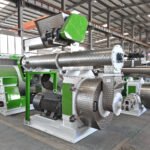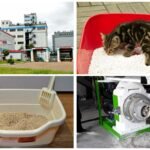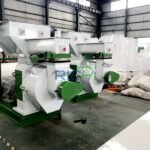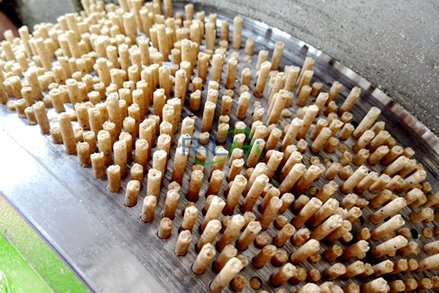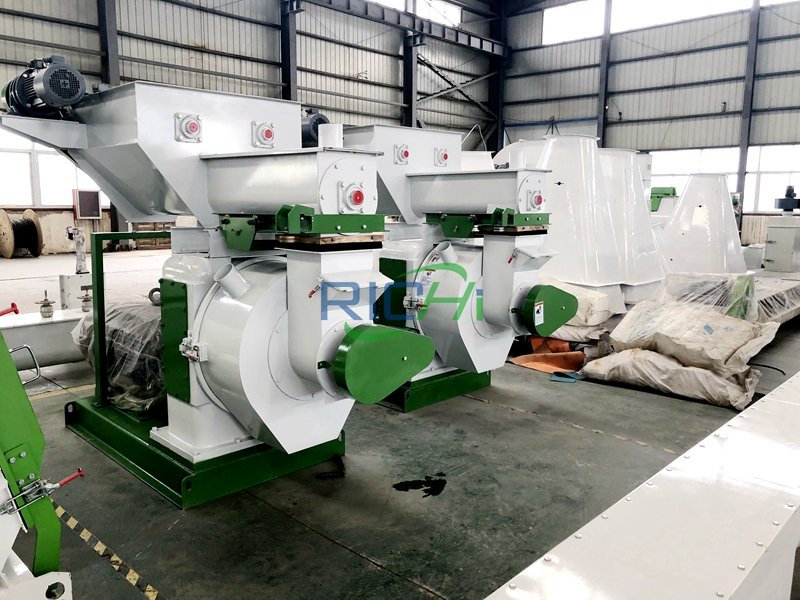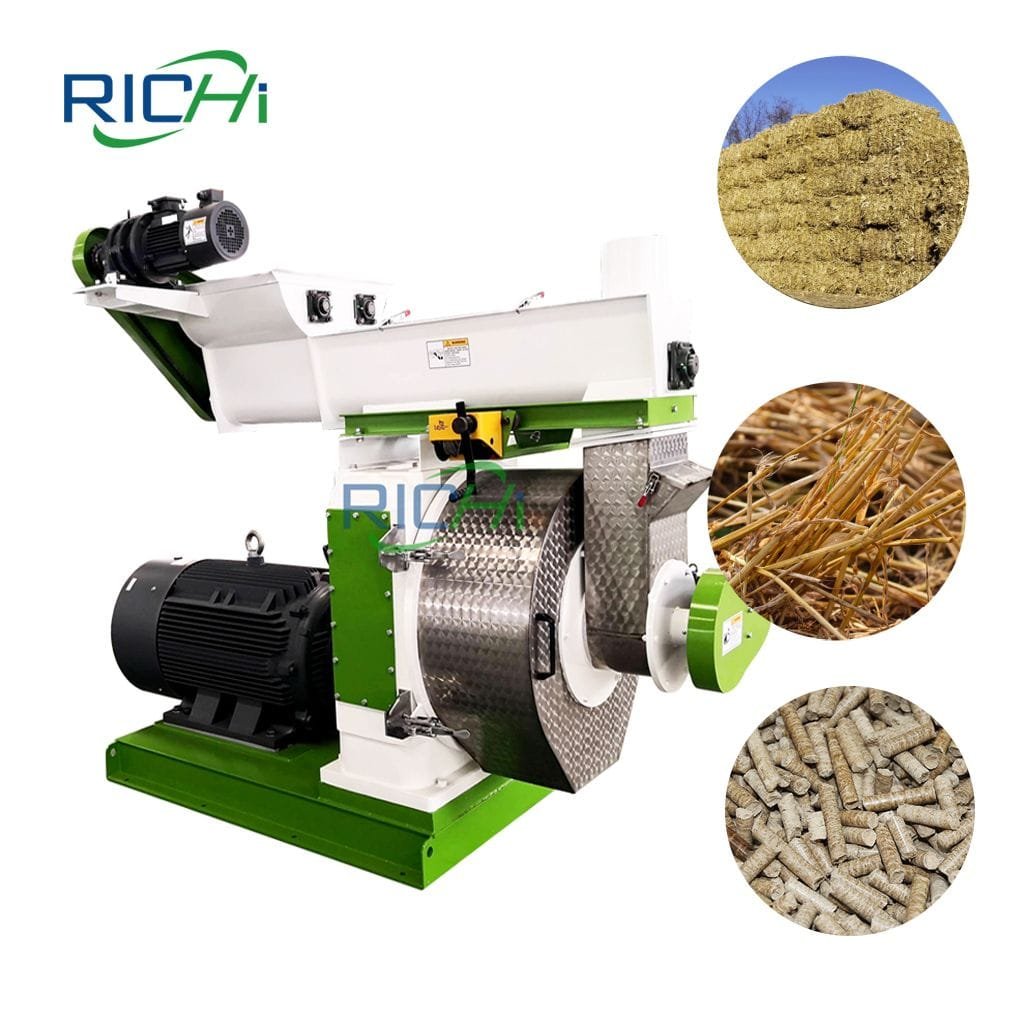Biomass pellet mills are a critical component of the renewable energy industry, producing high-quality pellets that can be used for heating and electricity generation. One important factor to consider when choosing a biomass pellet mill is the amount of biomass material that can be processed in an hour. In this article, we will discuss the factors that influence the processing capacity of a biomass pellet mill, as well as how to estimate the amount of biomass material that can be processed in an hour.

Factors that Influence Biomass Processing Capacity
Type of Biomass Material:
The type of biomass material being processed is a key factor in determining the processing capacity of a biomass pellet mill. Materials with high-density, low-moisture content, and low ash content such as wood are easier to process and can be processed at a higher rate than materials such as agricultural residues, which may have lower density and higher moisture content.
Related post: straw pellet plant
Size and Shape of Biomass Material:
The size and shape of the biomass material can also affect processing capacity. Smaller and uniformly sized materials are easier to process and can be processed at a higher rate than larger, irregularly shaped materials.
Moisture Content:
The moisture content of the biomass material is another important factor that affects processing capacity. High-moisture content materials require more energy to process, leading to a decrease in processing capacity. Additionally, high-moisture content materials can cause equipment wear and tear, leading to higher maintenance and repair costs.
Equipment Specifications:
The specifications of the biomass pellet mill equipment also play a role in determining processing capacity. Mills with higher horsepower motors and larger die sizes are generally capable of processing more biomass material per hour than mills with smaller specifications.
Operator Skill and Experience:
The skill and experience of the operator can also impact processing capacity. A well-trained and experienced operator can maximize the efficiency of the pellet mill and process more biomass material per hour than an inexperienced operator.
Related post: https://www.richipelletmachine.com/straw-pellet-plant/
How to Estimate Biomass Processing Capacity
Estimating the processing capacity of a biomass pellet mill requires an understanding of the factors that influence capacity, as well as the specifications of the pellet mill. Most pellet mills will have a specified processing capacity, which can be used as a starting point for estimating capacity.

To estimate processing capacity, it is important to consider the type, size, and moisture content of the biomass material being processed, as well as the equipment specifications of the pellet mill. A general rule of thumb is that a biomass pellet mill can process approximately one ton of biomass material per hour for every horsepower of motor capacity. For example, a pellet mill with a 100 horsepower motor could process approximately 100 tons of biomass material per hour.
It is important to note that this is a rough estimate and actual processing capacity may vary based on a variety of factors, including the type and quality of biomass material being processed, the skill of the operator, and the condition of the equipment.
Maximizing Biomass Processing Capacity
To maximize biomass processing capacity, it is important to choose a high-quality biomass pellet mill with the appropriate specifications for the biomass material being processed. Additionally, operators should ensure that the equipment is properly maintained and operated by skilled and experienced personnel.
Other strategies for maximizing processing capacity include:
Preparing Biomass Material:
Preparing biomass material before it is processed can help increase processing capacity. This may involve reducing the moisture content of the material, grinding or chipping the material to a uniform size, or removing any contaminants or impurities.
Using High-Quality Pellet Binders:
Using high-quality pellet binders can help increase the density and durability of pellets, allowing them to be processed at a higher rate. Additionally, high-quality pellet binders can reduce the amount of dust generated during processing, improving overall efficiency.
Monitoring Equipment:
Regularly monitoring the equipment and identifying any issues or wear and tear can help prevent downtime and maximize processing capacity. This may involve conducting regular maintenance and cleaning, replacing worn or damaged parts, and identifying any issues before they become more serious.
Properly Storing Biomass Material:
Properly storing biomass material before processing can help ensure that it is in optimal condition for processing, reducing the likelihood of issues that could decrease processing capacity. This may involve storing material in a dry, cool environment, protecting it from moisture and other contaminants, and ensuring that it is stored in a way that makes it easily accessible for processing.
Investing in Automation:
Investing in automation can help increase processing capacity by reducing the need for manual labor and improving overall efficiency. Automation can include a range of features, such as automatic feeders, computerized controls, and remote monitoring and control.
Conclusion
The amount of biomass material that can be processed by a biomass pellet mill in an hour is influenced by a range of factors, including the type and quality of biomass material, equipment specifications, and operator skill and experience. By understanding these factors and taking steps to maximize processing capacity, biomass pellet mill operators can increase efficiency, reduce costs, and produce high-quality pellets that are in demand in the renewable energy industry.
When choosing a biomass pellet mill, it is important to consider processing capacity as well as other factors such as cost, equipment specifications, and durability. By carefully selecting a high-quality pellet mill and taking steps to optimize processing capacity, operators can ensure that they are getting the most out of their investment and contributing to the growth of the renewable energy industry.
For details please contact: pelleting machine
WhatsApp:86 138 3838 9622
Email:enquiry@richipelletmachine.com



